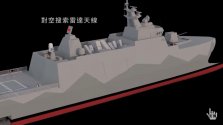tupolevtu, thanks for all the pictures. Where on the plan are the TC-II launchers - are they in box-launchers in the central area next to the HF-IIs and HF-IIIs or somewhere else?
Also is it confirmed that they'll now have 4 x HF-IIIs? Most of the articles I've read still say 8 HF-IIs and 8 HF-IIIs, albeit that could be old information based on the original design.

Here's the official render: So the missile canister layout from front to back is as follows: 2 HF-II+ 2 HF-II (pointing right), 4x2 TC-II + 2 HF-III (pointing left), 4x2 TC-II + 2 HF-III (pointing right), 2 HF-II+ 2 HF-II (pointing left)
